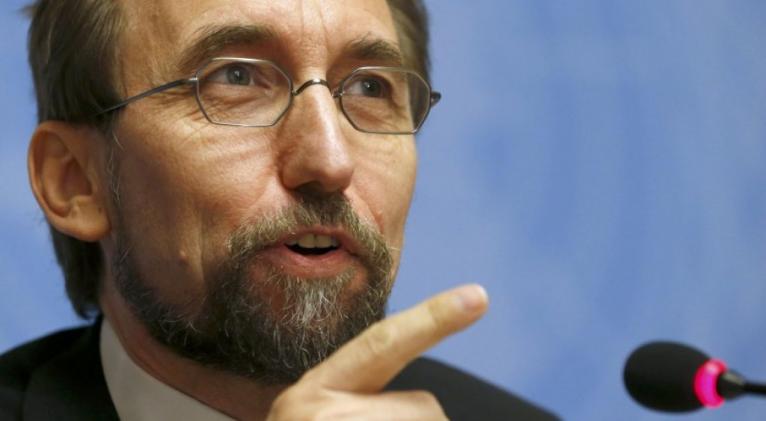UN: Anti-Ebola Measures May Violate Human Rights

Zeid Ra'ad al-Hussein, the United Nations high commissioner for human rights, warned that draconian quarantine measures would undermine efforts to contain the disease if they cause people to avoid reporting their illness.
He warned specifically against imposing criminal penalties on those who might contract the disease.
"The introduction of criminal penalties into public health responses is very likely to backfire by driving the epidemic underground," Zeid, Jordan's former ambassador to the United Nations, told a news conference here.
Placing people who may have the disease in overcrowded prisons, he said, would also "obviously simply compound the catastrophe."
Zeid spoke just before Isabelle Nuttall, the World Health Organization's director for global capacities, outlined WHO's plan to prevent Ebola from spreading from the three countries where it is now out of control: Liberia, Sierra Leone and Guinea. The effort will focus primarily on trying to prepare nearby countries to recognize and deal with cases that might be imported.
The first expert team will be sent to Mali on Sunday, she said, followed in a few days by a team dispatched to Ivory Coast.
Nuttall said WHO hopes to beef up medical capacity in 15 African nations, including Senegal and Guinea-Bissau, which border countries where the virus is rampant, and nations with close trade and travel links to the most affected countries and weak health systems. Those include Benin, Burkina Faso, Gambia, Ghana, Nigeria, South Sudan and Togo.
Zeid said there's no dispute that Ebola can "lay waste to human lives on an immense scale." But he cautioned that the disease also has potential to devastate the human rights of those who survive and that not enough attention has been paid to that possibility.
"Human rights can prevent disease, and they can also help cure disease," he said. "It is vital that human rights be integrated into the response to this appalling tragedy because only a response that is built on respect for human rights will be successful in quashing the epidemic."
He said any long-term solution to Ebola must also work to improve the quality of government in the affected countries, and he warned against measures that would lead to discrimination against Ebola sufferers by national, ethnic or tribal origin.
"Ebola thrives at the intersection of chronic poverty, failure to deliver adequate public services, and failures of public trust in the authorities. It should be obvious that any response must address those points," he said. "As the international community accelerates its medical assistance, it is also vital that every person struck down with Ebola be treated with dignity, not stigmatized or cast out."
Zeid said not only is it wrong to dehumanize and stigmatize people, he also warned that an "us versus them" approach to Ebola "drives people who need treatment into hiding, which reduces their chances of recovery and exposes others to risk."
Ravina Shamdasani, a spokeswoman for Zeid, told McClatchy that he was especially concerned that people who live in quarantine zones maintain the ability to earn a living, have access to food and water, and the ability to continue to attend school.
"This is not only a human rights issue," she said. "It maximizes the ultimate effectiveness of policy measures by ensuring public cooperation."
Shamdasani said some measures to isolate Ebola-affected communities "did not always include arrangements to bring in food, water or medical treatment."
They also increased public rage and mistrust of the authorities, she noted.
"Criminal penalties are also unhelpful and counterproductive. Such measures increase rage and confrontation, risk driving people underground and overcrowd prison system where conditions are conducive to rapid spread of disease," she said.
———
(Zarocostas is a McClatchy special correspondent.)













Add new comment